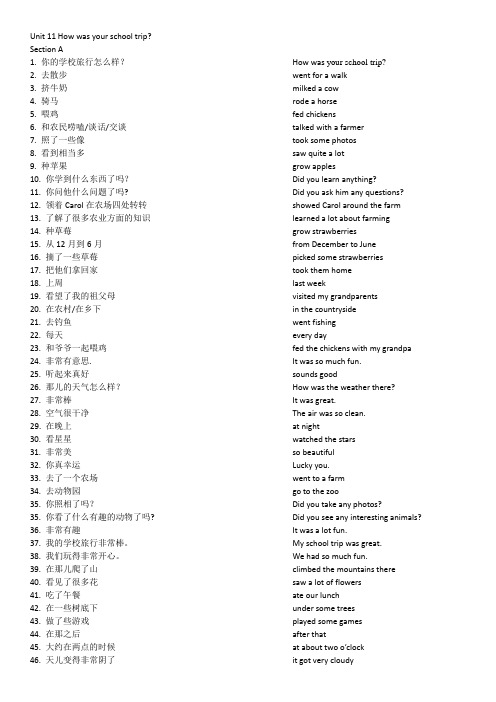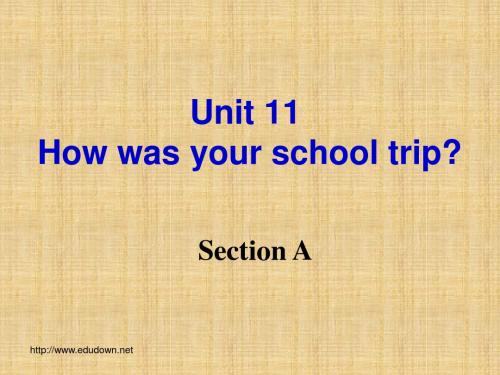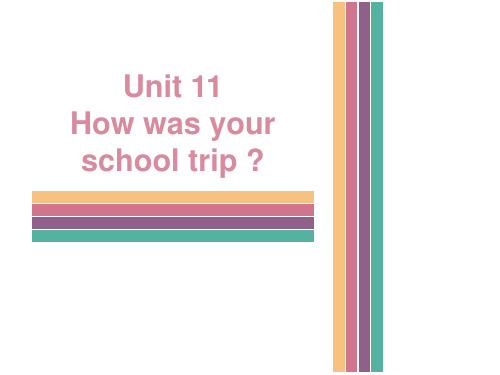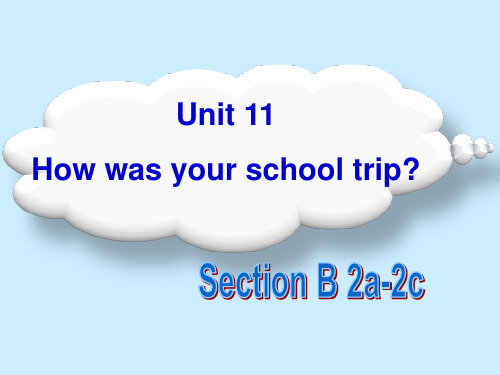2013年新人教版七年级英语下册Unit_11_How_was_your_school_trip_Section_A课件
七年级英语下册Unit 11 How was your school trip超全重要短语和句子(英汉対译)

Unit 11 How was your school trip?Section A1. 你的学校旅行怎么样?How was your school trip?2. 去散步went for a walk3. 挤牛奶milked a cow4. 骑马rode a horse5. 喂鸡fed chickens6. 和农民唠嗑/谈话/交谈talked with a farmer7. 照了一些像took some photos8. 看到相当多saw quite a lot9. 种苹果grow apples10. 你学到什么东西了吗?Did you learn anything?11. 你问他什么问题了吗? Did you ask him any questions?12. 领着Carol在农场四处转转showed Carol around the farm13. 了解了很多农业方面的知识learned a lot about farming14. 种草莓grow strawberries15. 从12月到6月from December to June16. 摘了一些草莓picked some strawberries17. 把他们拿回家took them home18. 上周last week19. 看望了我的祖父母visited my grandparents20. 在农村/在乡下in the countryside21. 去钓鱼went fishing22. 每天every day23. 和爷爷一起喂鸡fed the chickens with my grandpa24. 非常有意思. It was so much fun.25. 听起来真好sounds good26. 那儿的天气怎么样?How was the weather there?27. 非常棒It was great.28. 空气很干净The air was so clean.29. 在晚上at night30. 看星星watched the stars31. 非常美so beautiful32. 你真幸运Lucky you.33. 去了一个农场went to a farm34. 去动物园go to the zoo35. 你照相了吗?Did you take any photos?35. 你看了什么有趣的动物了吗? Did you see any interesting animals?36. 非常有趣It was a lot fun.37. 我的学校旅行非常棒。
2013年新人教版七年级英语下册Unit11Howwasyourschooltrip全单元课件

2b Listen again. Circle T for true or F for false.
1 The farmer showed Carol around the farm. T F
2 Carol learned a lot about farming. T F
3 The farmers grow strawberries from December
Did you......yesterday? Yes,I did./No,I didn't.
play basketball
watch TV
play computer games
talk with a farmer stay at home
Did he/she......yesterday? Yes, he/she did. No,he /she didn't.
Exercises A: What _d_id_ you do
yesterday? B: I _w_e_n_t_ to the movies.
A: What _d_id_ you do last weekend?
B: I d__id_ my homework.
What did you _d_o_ last weekend? We __fe_d__c_h_ic_k_e_n_s_________
Practice
A: How was your school trip? B: It was … (boring/interesting/good/great…) A: What did you do on the school trip? B: I went for a walk with my classmates.
2013春人教版英语七下《Unit11 How was your school trip Section A》ppt课件

2b. Listen again and circle “T” or “F”.
1. The farmer showed Carol around the farm. T F
2. Carol learned a lot about farming. 3. The farmers grow strawberries from
saw some sharks
went to the zoo
went to the beach
bought a souvenir
hung out with friends
played basketball
played soccer
went fishing
went skateboarding
took photos
ate some ice cream
had a hamburger
cleaned the room
watched TV
1a. Match the phrases with the pictures.
1. went for a walk ____ e 2. milked a cow ____ b 3. rode a horse ____ 4. fed chickens ____ a c 5. talked with a farmer ____ f 6. took some photos ____ d
What did Carol do?
She picked some strawberries.
2d. Role-play conversation.
How was your trip last week? Peter: Hi, Eric. _______ Eric: It was exxellent. I _______ visited my grandparents in the countryside. did Peter: Oh, nice. What _______ you do? Eric: I went ___________ fishing every day. And I fed the chickens with my grandapa. It was so much fun. Sounds good How was the weather there? Peter: _____________. Eric: It was great and the air was so clean. I _________________ watched the stars at night. They were so beautiful. Peter: Lucky you.
人教版七年级英语下册Unit11Howwasyourschooltrip单元复习

2.__ta_k_e_____ 4.__h_a_d_____ 6._r_o_d_e_____ 8.__b_u_t_____ 10.__a_______
基础复现天天练 Work seriously
●难点释疑 ①go on a school trip意为“参加学校郊 游”。如: All the students went on a school trip last week. 上周所有学生都参加学校郊游活动。 ②worry是动词,意为“担心”。常见一般 搭配为 worry about。如: You don’t need to worry about me.
目录 contents
4 主要语法
主要语法
Work seriously
四、主要语法 用一般过去时询问或描述过去事 件及关感受
★询问对过去事件的感受: 1.—How was your school trip? —It was great. ——你的学校旅行怎么样?——很好。 2.—Were the strawberries good ? —Yes, they were. ——草莓好吃吗?——是的,好吃。
Life on the farm was so much 8 .We went fishing in the early morning, went 9 a walk after
基础复现天天练 Work seriously
supper and watched the 10 at night when the weather was fine.They were very beautiful.
Have 10 nice day! Write to me if you can.
Yours, Lily
七年级英语下册人教版unit11_How_was_your_school_trip_Section_A1

see ---saw
Did they pick any strawberries on the farm? Yes, they did. They picked strawberries.
pick ---picked Were the strawberries good? Yes, they were. No, they weren’t.
Peter: Oh, nice. What did you do?
Pairwork
Eric: I went fishing every day. And I fed the chickens with my grandpa. It was so much fun.
Peter: Sounds good .How was the weather there?
climbed the mountains (climb)
took some photos (take)
(is) --How was your last school trip ?
--It was ... (is)
(Are) -- Were you happy on your last school trip?
Did he play soccer yesterday?
3. 实义动词的变化: 实义动词分规则变化和不规则变化。 规则变化有以下几种: (1) 一般情况下在动词后加-ed。 e.g. play—played visit—visited walk—walked clean—cleaned
(2) 以不发音的e结尾的词,在词尾 加-d。 e.g. note—noted like—liked dance—danced name—named
人教版unit_11_How_was_your_school_trip___reading

课堂评价——学科班长总结
精彩小组 掌握本课的单 终用英语完成老师要 求的各项任务 善于提问,富有创新 精神 精彩同学
I……
They....
go fishing
visit a museum
went fishing
climb mountains go to the zoo visited a museum visit a fire station climbed mountains ride a horse went to the zoo visited a fire station
climb mountains go fishing
go to the zoo
visit a museum
ride a horse
visit a fire station
What do you do on weekends? What did you do last weekend? What do they do every day? What did they do yesterday?
彼得:你好,埃里克。你上星期的旅行如何? 埃里克:特棒。我探望了乡下的爷爷奶奶。 彼得:喔,很好嘛。你都干什么了? 埃里克:我每天去钓鱼,和爷爷奶奶一道喂 鸡。那真是蛮好玩的。 彼得:听起来真好。那边的天气如何? 埃里克:天气好极了,空气是那么清新。夜 晚我会看星星,它们是那么美丽。 彼得:你真幸运。
1. Remember the key words and expressions in Unit 11 and use them freely. 2. Can read and retell with the text by reading and retelling. 3. Love trip and enjoy life.
七年级英语下册Unit11Howwasyourschooltrip说课稿(人教新目标版)
七年级英语下册 Unit 11 How was your school trip说课稿(人教新目标版)一. 教材分析本次说课的教材为人教新目标版七年级英语下册Unit 11 How was your school trip。
本单元主要围绕学校旅行的话题展开,通过描述旅行的经历和感受,让学生学会使用一般过去时进行问答。
教材内容丰富,包括听力、口语、阅读和写作等方面,有助于学生全面提高英语水平。
二. 学情分析七年级的学生已经掌握了基本的英语语法和词汇,具有一定的听说读写能力。
但部分学生对一般过去时的运用还不够熟练,需要在课堂上进行针对性的训练。
此外,学生对学校旅行的经历和感受有较高的兴趣,可以激发他们学习英语的积极性。
三. 说教学目标1.知识目标:学生能够掌握一般过去时的问法和答法,正确运用动词过去式描述过去发生的事情。
2.能力目标:学生能够听懂、会说、会读、会写关于学校旅行的描述,提高英语综合运用能力。
3.情感目标:通过本节课的学习,学生能够表达对学校旅行的喜爱和回忆,培养对英语的兴趣。
四. 说教学重难点1.重点:学生能够熟练运用一般过去时进行问答,描述学校旅行的经历。
2.难点:学生能够正确运用动词过去式,表达过去发生的事情。
五. 说教学方法与手段1.教学方法:采用任务型教学法,让学生在实际语境中练习英语,提高运用能力。
2.教学手段:利用多媒体课件、图片、卡片等辅助教学,增加课堂趣味性。
六. 说教学过程1.热身(5分钟):播放一首关于旅行的英文歌曲,让学生谈论自己的旅行经历,激发学习兴趣。
2.导入(10分钟):通过展示一组学校旅行的照片,引导学生谈论旅行中的趣事,为新课的学习做好铺垫。
3.新课呈现(15分钟):讲解一般过去时的问法和答法,示例说明如何用动词过去式描述过去发生的事情。
让学生跟读、模仿,确保正确掌握。
4.实践环节(15分钟):学生分角色扮演,模拟学校旅行的场景,运用一般过去时进行问答。
2013人教版七下英语Unit 11 How was your trip习题
复习Unit 11 How was your trip?Name: Class:重点短语1. go for a walk 去散步2. milk a cow 挤牛奶3. ride a horse 骑马4. feed chickens 喂小鸡5. talk with 与……谈话6. take photos 拍照7. quite a lot 相当多8. show…around 带领……参观9. learn about 了解10. from…to…从……到……11. grow strawberries 种植草莓12. pick strawberries 采草莓13. in the countryside 在乡下14. go fishing 去钓鱼15. at night 在夜晚16. a lot of 许多;大量17. come out 出来18. go on a school trip 去学校郊游19. along the way 沿线20. after that 之后21. not at all/not...at all 根本不,完全不22. all in all 总的来说23. take a / the train 乘火车24. be interested in 对……感兴趣25. not...at all 根本不……26. visit a fire station 参观消防局27. ask sb. sth. 问某人某事28. have a nice weekend 度过一个愉快的周末29. buy sth. for sb. = buy sb. sth. 为某人买某物30. teach sb. how to do sth. 教某人怎样做某事重点句型1. —How was your school trip? 你的学校郊游怎么样?—It was great! 好极了!2. —Did you go to the zoo? 你去动物园了吗?—No, I didn’t. I went to a farm. 不,没有。
七年级英语下册Unit11Howwasyourschooltrip知识点汇总(带答案)
七年级英语下册Unit11Howwasyourschooltrip知识点汇总单选题1、The children went to the mountains ________ Friday afternoon.A.atB.forC.onD.in答案:C句意:孩子们星期五下午去了山上。
考查时间介词。
A. at在;B. for为了,给;C. on在…上;D. in在…里。
在具体的某一天,或具体某一天的早上,中午,下午,晚上或夜晚,用介词on,可知“Friday afternoon(星期五下午)”用介词on;选C。
小提示:时间介词at/on/in/for的用法:1 .在几点几分或很短的时间、节日,使用介词at,例如,at nine, at 8:15, at this moment,at that time,at Christmas。
2 .在具体的某一天,或具体某一天的早上,中午,下午,晚上或夜晚,用介词on,例如,on Sunday, on June 3rd, on a cold winter morning, on Monday evening,on Christmas Day。
3 .在一段较长的时间,使用in,例如,in May,in the morning,in 1989,in two weeks。
4 .做某事做了多长时间,使用for+时间段,例如,I have studied English for three years。
2、— The song My Country and I is very________ in China.— Yes. Chinese like to sing this song to show their love of being Chinese. A.directB.clearC.popularD.correct答案:C句意:——歌曲《我和我的祖国》在中国很受欢迎。
新人教版七年级英语下册Unit 11 How was your school trip Sectio
1b. Listen and answer the questions.
4.How to ……疑问句+不定式? They want to know how to make a model plane? 他们想知道如何制作飞机模型?(报纸) 5.take photos=take pictures照相 take a photo /photos of sb 给某人拍照 6.buy——过去式:bought 买 buy sb sth =buy sth for sb 给某人买某物 buy some lovely gift for my parents。 点睛:p74 7. lovely 形容词:可爱的 报纸:Helen has a lovely dog and she likes it very much。 Helen 有一个可爱的狗狗,她非常喜欢它。
2.It is +adj+to do sth 做某事很怎么样。 3.any 用于否定句,此句有didn’t)
(7)There were also too many people and I couldn’t really see or hear the guide. (人也太多而且我也不能看见或听见向导说的 话。)
expensive
3a. Look at the pictures of Bob’s school trip. Complete his diary entry.
- 1、下载文档前请自行甄别文档内容的完整性,平台不提供额外的编辑、内容补充、找答案等附加服务。
- 2、"仅部分预览"的文档,不可在线预览部分如存在完整性等问题,可反馈申请退款(可完整预览的文档不适用该条件!)。
- 3、如文档侵犯您的权益,请联系客服反馈,我们会尽快为您处理(人工客服工作时间:9:00-18:30)。
talk with a farmer stay at home watch the stars play tennis
1b Listen and circle the three things Carol did on her school trip in 1a.
went for a walk milked a cow rode a horse fed chickens talked with a farmer took some photos
肯定句:I rode a horse last Sunday. (1) (2) 否定句:I didn‘t ride a horse last Sunday. 一般疑问句: Did you ride a horse last Sunday? 肯定回答:Yes, I did. 否定回答:No, I didn't. 特殊疑问句: (1)What did you do last Sunday? (2)When did you ride a horse?
• He milked a cow yesterday.
否定句: 一般疑问句: 肯定回答: 否定回答: 特殊疑问句:
• I did my homework last weekend.
否定句: 一般疑问句: 肯定回答: 否定回答: 特殊疑问句:
VI. 完成下列句子。
1. Lucy did her homework at home.
3. I was very busy last week. (改否定
句和一般疑问句)
I wasn’t ______ very busy last week. _____ you very busy last week? Were 4. There was some orange in the cup. (变一般疑问句) _____ any orange in the cup? Was there ____
took some photos
go for a walk
went for a walk
talk with a farmer
talked with a farmer
1a Match the phrases with the pictures. went for a walk e milked a cow b rode a horse a fed chickens c talked with a farmer f took some photos d
were did went fed ate rode said got took learned learnt
改为一般过去式
1. I play basketball every day .(yesterday) I played basketball yesterday. 2. John is watching TV.(yesterday evening) John watched TV yesterday evening 3.The strawberries are very good. The strawberries were very good. 4.They work in a hospital.(last year) 5.He goes to school by bike.(yesterday)
1c Ask and answer questions about Carol’s school trip.
A: Did Carol take any photos? B: Yes, she did. A: Did Carol ride a horse? B: A: Did Carol talk with the farmer? B:
V. 汉译英
1. 他上周在农场骑马。 Last week he rode a horse on the farm. 2. 他上个月爬山了。 He climbed the mountain last month. 3. 他一小时前喂了小鸡。 He fed chickens an hour ago.
4. 你昨天去了动物园吗?没有,我去了
口诀:
• • • •
一加ed, 二加d, 三要双写, 四注意,y变成ied,特殊形式特殊 记。
2.不规则动词的过去式需特殊记忆。 was am(is) are(是) could do/does(做,干) can(能) had have (has)(有) go(走) came feed (喂) come(来) bought eat(吃) buy (买) grow(生长) grew ride (骑) ran run(跑) say (说) saw see (看见) get(变得,到达) taught take(带) teach(教) swim(游泳) swam learn(学习) 详见课本P142页
• My school trip was interesting. • 否定句: • 一般疑问句: • • 肯定回答: • 否定回答: • 特殊疑问句:
The farmer was friendly to us.
否定句: 一般疑问句: 肯定回答: 否定回答: 特殊疑问句:
2. 行为动词(v.)的一般过去时态PhBiblioteka asesmilk a cow
go for a walk
ride a horse
talk with a farmer
take some photos feed chickens
What do you do every day?
What did you do last weekend?
I……
They worked in a hospital last year.
He went to school by bike yesterday
二、一般过去时的结构
1. Be动词的一般过去时
am/is ---was
are---were
(1)肯定句式:主语 + was / were + 其它. (2)否定句式:主语 + wasn’t /weren’t+ 其它.
feed chickens
fed chickens
milk a cow
milked a cow rode a horse
ride a horse
What do they do every day? They.... take some photos
What did he/she do yesterday?
不规则动词 go went ride rode do did is was are were have had eat ate buy bought see saw 规则动词 pick picked visit visited watch watched climb climbed study studied worry worried play played live lived stop stopped
Unit 11 How was your school trip?
Section A
2014年5月26日 1
Grammars : 一般过去时
一、 一般过去时的概念
表示过去某个时间或某一段时间内发 生的的动作或存在的状态,常和表示 过去的时间状语连用,如 yesterday,last night, in1990,two days ago 等。一般过去式也表示过去经常 或反复发生的动作,常和often,always 等表示频度的时间状语连用。
2014年5月26日
2
• 1.I went to the zoo yesterday. • 2.He was eleven years old last year. • 3.They bought some books five years ago. • 4.His father went to Shanghai in 2003.
(1)肯定句式:主语 + v-ed+ 其它.
【do , does---did】
(2)否定句式:主语 + didn’t + v原形+ 其它.
【did not = didn’t】
(3)一般疑问句:Did + 主语+ v原形+ 其它? 肯定回答:Yes,主语+did. 否定回答:No,主语+did’t. (4)特殊疑问词+did+主语+v.原形+其他?
Did you......yesterday? Yes,I did./No,I didn't.
play basketball watch TV
play computer games
Did he/she......yesterday? Yes, he/she did. No,he /she didn't.
巧记一般过去时
动词一般过去时,表示过去发生事; be用was或用were, have, has变had; 谓语动词过去式,过去时间坐标志; 一般动词加-ed,若是特殊得硬记。 否定句很简单,主语之后didn’t添; 疑问句也不难,did放在主语前; 如果谓语之前有did,谓语动词需还原; 动词若是was,were,否定就把not添。
(改否定句)
Lucy ______ __ her homework at home. didn’t do 2. His father worked all day last Monday. (改一般疑问句) ____ _____ all day last Did his father work Monday?
wasn’t=was not
weren’t=were not
(3)一般疑问句:Was/Were + 主语 + 其它? 肯定回答:Yes,主语+ was / were . 否定回答:No,主语+ wasn’t /weren’t. (4)特殊疑问词+was/were+主语+其他?
